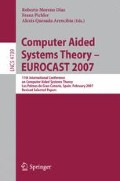Abstract
Consideration has arisen on the use of video games as learning tools since they are deemed as active elements in classrooms. New game technologies have helped creating alternative strategies to increase cognitive skills in the field of Special Education. This paper describes our experience in video games design and in new forms of human-computer interaction addressed to develop didactic games for children with communication problems such as autism, dysphasia, ictus or some types of cerebral paralysis.
Access this chapter
Tax calculation will be finalised at checkout
Purchases are for personal use only
Preview
Unable to display preview. Download preview PDF.
References
Provenzo, E.: Video kids. Harvard University Press, Cambridge (1991)
Greenfield, P.M.: Video Games as Cultural Artifacts. Interacting with Video. Ablex Publishing, Norwood, NJ (1996)
McFarlane, A., Sparrowhawk, A., Heald, Y.: Report on the educational use of games: An exploration by TEEM of the contribution which games can make to the education process (2002), http://www.teem.org.uk/publications/teem_gamesined_full.pdf
Rosas, R., Nussbaum, M., Grau, V., López, X., Salinas, M., Flores, P., Correa, M., Lagos, F.: Más allá del Mortal Kombat: Diseño y evaluación de videojuegos educativos para Lenguaje y Matemáticas para el Nivel Básico I. Psykhé, 9. pp: 125-141 (2000)
IGDA. Accesibility in Games: Motivations and Approaches. International Game Developers Asscoiation (2004), http://www.igda.org/accessibility/IGDA_Accessibility_WhitePaper.pdf
Gardner, H.: Frames of Mind: The Theory of Multiple Intelligences. Basic Books. ISBN 978-0465072510
González, J. L., Cabrera, M.: Sc@ut DS: Sistema de Ayuda a la Comunicación y al Aprendizaje. IV International Conference on Multimedia, Information and Communication Technologies in Education (m-ICTEE2006). pp: 1116-1120 (2006), ISBN: 84-690-2472-8
Sidman, M.: Reading and auditory-visual equivalente. Jounal of Speech and Hearing Research 14, 5–13
Author information
Authors and Affiliations
Editor information
Rights and permissions
Copyright information
© 2007 Springer-Verlag Berlin Heidelberg
About this paper
Cite this paper
González, J.L., Cabrera, M.J., Gutiérrez, F.L. (2007). Using Videogames in Special Education. In: Moreno Díaz, R., Pichler, F., Quesada Arencibia, A. (eds) Computer Aided Systems Theory – EUROCAST 2007. EUROCAST 2007. Lecture Notes in Computer Science, vol 4739. Springer, Berlin, Heidelberg. https://doi.org/10.1007/978-3-540-75867-9_46
Download citation
DOI: https://doi.org/10.1007/978-3-540-75867-9_46
Publisher Name: Springer, Berlin, Heidelberg
Print ISBN: 978-3-540-75866-2
Online ISBN: 978-3-540-75867-9
eBook Packages: Computer ScienceComputer Science (R0)

